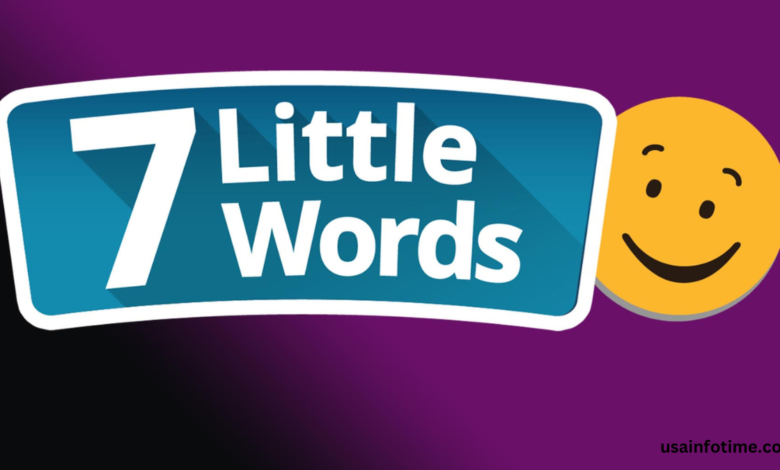Understanding the Concept of “Drudgery” in the Game of “7 Little Words”

Introduction to the Concept of Drudgery
We’ve all been there—the moments when a task seems so tedious, so monotonous, that it feels like a never-ending slog. These moments of mind-numbing labor can drain our energy and enthusiasm, making us wonder if there’s a light at the end of the tunnel.7 little words This type of work, often referred to as “drudgery,” has an unfortunate way of creeping into both our professional and personal lives. In some cases, we can even see it pop up in our hobbies and entertainment, including games like 7 Little Words.
“7 Little Words” is a popular word puzzle game where players are given a set of clues and must combine letter tiles to form the answers. Sometimes, the gameplay can feel like a bit of drudgery—those clues that seem impossible to crack, the ones that make us scratch our heads and wish we could just take a break. But how does drudgery fit into the game, and what can we learn from the experience of trying to push through it?
In this article, we’ll explore the relationship between drudgery and the puzzle-solving process in 7 Little Words, unpacking why this type of gameplay can be both frustrating and rewarding. Along the way, we’ll discuss the broader idea of drudgery in everyday life and offer insights on how to tackle it head-on—whether you’re solving puzzles or tackling mundane tasks.
What is Drudgery?
Drudgery is often described as work that is dull, tiresome, and repetitive. It’s the kind of task that drains us without offering much in terms of excitement or fulfillment. The key component of drudgery is its lack of variety—when you’re stuck in a rut and have no clear sense of progression, every task can feel like an uphill battle.
In daily life, drudgery can take many forms. For some, it might be the endless cycle of household chores—washing dishes, folding laundry, or cleaning the floors. For others, it might come in the form of tedious work tasks that require little creativity or challenge. Drudgery doesn’t discriminate; it affects everyone in one way or another, and it often creates a mental barrier that makes us hesitant to dive into something new.
Connection Between Drudgery and 7 Little Words
In the world of puzzles, 7 Little Words is unique in that it straddles the line between challenge and drudgery. The game’s core premise is simple enough—each puzzle provides a series of clues, and players must use their letter tiles to form answers that match those clues. It’s fun at first, but over time, certain puzzles can become frustrating when the answers aren’t immediately clear. This sense of mental fatigue is often what we experience when we encounter “drudgery.”
Some may find it easy to dismiss 7 Little Words as “just another puzzle game,” but in reality, it provides an interesting lens through which we can explore the phenomenon of drudgery. When the clues get harder, and the answers seem elusive, players may find themselves stuck in a cycle of frustration. It’s this experience of drudgery that can make 7 Little Words feel like both a test of patience and a rewarding challenge.
Why Do We Experience Drudgery in Games?
The experience of drudgery in games like 7 Little Words is often tied to a psychological principle known as cognitive load. Cognitive load refers to the mental effort required to process information and solve problems. When the clues in 7 Little Words become more obscure or complex, our brains are forced to work harder to find the solution. This heightened mental effort can trigger feelings of frustration and weariness, much like the feeling we get when performing repetitive, unchallenging tasks in real life.
Interestingly, the sense of drudgery in a game can be exacerbated by the feeling that the solution is “just out of reach.” It’s not that the task is insurmountable; rather, the difficulty lies in the sense that you should be able to solve it but are temporarily stuck. This cognitive struggle is what leads to the sensation of drudgery, as players try over and over again to crack the code of the puzzle.
Role of Reward and Motivation
In the context of 7 Little Words, the potential for a satisfying reward plays a huge role in alleviating the drudgery. The sense of accomplishment that comes from solving a tough puzzle is often enough to override the frustration that built up earlier. This reward is the light at the end of the tunnel—what makes the drudgery worthwhile. Without this motivation, the task would feel even more tedious and draining.
The human brain is wired to seek rewards, and in puzzle games, this is amplified. Whether it’s a simple “you did it!” message or the joy of filling in a completely solved puzzle grid, this feedback loop helps to reduce the negative feelings associated with drudgery.
How 7 Little Words Makes Use of Drudgery
The game 7 Little Words may intentionally introduce elements of drudgery to keep players engaged. Puzzle creators understand that overcoming challenges is a core part of what makes games enjoyable, so they design puzzles that gradually increase in difficulty. By doing so, they create a cycle where players push through moments of mental fatigue to experience the satisfaction of solving a complex clue. This cycle helps to maintain player engagement, even during the more difficult, “drudgerous” moments.
Tips for Overcoming Drudgery in 7 Little Words and Beyond
One of the most effective ways to overcome feelings of drudgery is by taking breaks. When faced with a particularly difficult puzzle in 7 Little Words, stepping away for a few minutes can help reset your mind. Returning to the puzzle with fresh eyes might reveal a clue you missed earlier, reducing the mental load required to solve it.
This technique is also useful in real-life situations when facing tasks that feel tiresome. Whether it’s work, chores, or creative projects, stepping away briefly can provide the mental clarity needed to tackle the task with renewed energy.
Change Your Approach
Sometimes, drudgery arises when we get stuck in a repetitive pattern. In 7 Little Words, players often get into a rhythm of solving one clue after another, but if one proves to be too difficult, this rhythm can quickly turn into frustration. Instead of forcing yourself to solve a difficult clue, try focusing on a different one. Shifting your attention to another part of the puzzle can help ease the mental strain.
In the real world, this approach also applies. When a task becomes too monotonous, trying a different strategy or switching tasks for a while can provide relief. Variety can be a game-changer when it comes to overcoming drudgery.
Celebrate Small Wins
In the world of 7 Little Words, every small victory counts. Whether it’s solving one out of seven clues or getting a part of the puzzle completed, celebrating these mini-achievements can help motivate you to push through the more challenging parts. Positive reinforcement is essential for maintaining motivation, both in games and in life.
When dealing with real-life drudgery, celebrating small milestones can help maintain momentum. For example, if you’re tackling a long project at work, take a moment to appreciate the progress you’ve made so far. This keeps your spirits high and prevents the task from feeling like an insurmountable chore.
Maintain a Positive Mindset
Finally, one of the most important strategies for overcoming drudgery is to maintain a positive mindset. It’s easy to get bogged down by frustration when a puzzle seems impossible, but approaching it with a positive attitude can make a world of difference. Remember that drudgery is often temporary, and the effort you put in will ultimately be rewarded.
This principle applies to life in general as well. Maintaining optimism when faced with tedious tasks can help you power through even the most challenging moments.
How Drudgery Affects Our Daily Lives
While 7 Little Words offers a unique look at drudgery in the context of gaming, it also serves as a metaphor for the way we handle repetitive tasks in our daily lives. Many people encounter drudgery at work, whether it’s managing emails, attending meetings, or dealing with tasks that feel like they have no end in sight. At home, chores like cleaning and organizing can feel like a never-ending cycle of drudgery.
Despite the negative feelings that drudgery can provoke, it’s important to recognize that these tasks serve a purpose. They keep things running smoothly, ensure that we meet our responsibilities, and often allow us to enjoy the more exciting aspects of life. However, it’s the way we manage drudgery that determines how much it impacts our well-being.
Conclusion
Drudgery may be a natural part of life, whether you’re playing a game like 7 Little Words or going about your daily tasks. But by understanding its psychological effects and employing strategies to manage it, you can make these experiences more manageable and even enjoyable. Drudgery, after all, isn’t about the task itself—it’s about how you approach it. With the right mindset and strategies, you can transform even the most tiresome of tasks into something rewarding.





